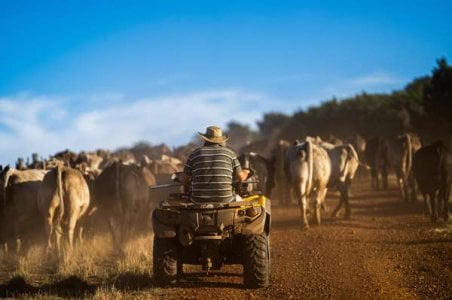Lots at steak: Aussie farmer's Japan trip sparks pricing rumble with supermarket giants!
- Replies 23
As we often stroll through the aisles of our local Coles or Woolworths, many take the prices we see on the shelves for granted.
Most of the time, it is assumed that the cost of goods, especially homegrown products like Australian beef, reflects the fair market value.
However, a recent discovery by an Aussie farmer on a trip to Japan has raised eyebrows and sparked a conversation about the pricing strategies of our supermarket giants.
Andrew Dunlop, a cattle farmer from southern New South Wales, was taken aback when he stumbled upon Australian cubed beef in Tokyo, retailing for $18.35 per kilogram.
This price point was notably lower, by about $4 than what he was accustomed to seeing back home in the major Australian supermarkets.
To add to the surprise, Australian rump steak was also on display in a Tokyo supermarket for approximately $28.90 per kilogram, a stark contrast to the $28 to $40 per kilogram range that Woolworths charges.

The meat in question—sourced from the Hanamasa retail network in Japan, a discount retailer known for its near wholesale prices—seemed to defy the economics of international trade.
After all, this beef had travelled across the ocean, incurring shipping costs and a hefty 25 per cent import tariff, yet still managed to undercut Australian retail prices.
This perplexing price disparity prompted Mr Dunlop to delve deeper, eventually including his findings in a submission to the ACCC inquiry into Australia’s supermarket sector.
Mr Dunlop detailed the variety of Australian meat he observed stocked on Japanese store shelves.
‘I could see [a] finely sliced product that would be equivalent to our stir fry…and I saw casserole,’ he recalled.
‘I saw a rump steak, and they were all seemingly pretty competitive with what we would be paying here.’
Mr Dunlop perceived this scenario as indicative of the control exerted by a handful of major supermarkets in Australia.
He elaborated that, unlike the Australian market, Japan's retail sector is not monopolised by a limited number of corporations.
‘Any individual retailer in Japan probably has at most a 10 per cent share of the market, although there will be some regional differences,’ he added.
Australia is a major player in the global meat industry, exporting around 70 per cent of its meat, with Japan being its largest export market in 2022.
This strong trade relationship makes the discovery of cheaper Australian beef on Japanese shelves even more baffling for consumers and industry stakeholders.
In response to the uproar, a spokesperson for Woolworths offered a statement suggesting it was ‘not really possible to make a like-for-like comparison between Australia and Japan’.
‘Australia produces beef across a very broad quality spectrum,’ they pointed out.
‘Woolworths purchases premium cattle to a very tight quality specification, quality which is independently certified through the Meat Standards Australia program.’
‘In none of the pictures of the Japanese products is this certification visible,’ the spokesperson continued.
The discussion around supermarket dominance in Australia extends beyond just the local market, as seen in Mr Dunlop’s observations.
However, amidst this debate, consumers continue to seek quality products at affordable prices.
This quest for value and satisfaction has led many to explore alternative options, such as the acclaimed ALDI steak, praised for its remarkable marbling and affordability.
 Have you noticed discrepancies in pricing for Australian products overseas? Do you feel that the prices at our local supermarkets reflect the true value of the goods? Share your thoughts and experiences in the comments below.
Have you noticed discrepancies in pricing for Australian products overseas? Do you feel that the prices at our local supermarkets reflect the true value of the goods? Share your thoughts and experiences in the comments below.
Most of the time, it is assumed that the cost of goods, especially homegrown products like Australian beef, reflects the fair market value.
However, a recent discovery by an Aussie farmer on a trip to Japan has raised eyebrows and sparked a conversation about the pricing strategies of our supermarket giants.
Andrew Dunlop, a cattle farmer from southern New South Wales, was taken aback when he stumbled upon Australian cubed beef in Tokyo, retailing for $18.35 per kilogram.
This price point was notably lower, by about $4 than what he was accustomed to seeing back home in the major Australian supermarkets.
To add to the surprise, Australian rump steak was also on display in a Tokyo supermarket for approximately $28.90 per kilogram, a stark contrast to the $28 to $40 per kilogram range that Woolworths charges.

Australian cattle farmer Andrew Dunlop found that Australian beef is priced lower in a Tokyo supermarket than in Coles and Woolworths in Australia. Credits: Shutterstock
The meat in question—sourced from the Hanamasa retail network in Japan, a discount retailer known for its near wholesale prices—seemed to defy the economics of international trade.
After all, this beef had travelled across the ocean, incurring shipping costs and a hefty 25 per cent import tariff, yet still managed to undercut Australian retail prices.
This perplexing price disparity prompted Mr Dunlop to delve deeper, eventually including his findings in a submission to the ACCC inquiry into Australia’s supermarket sector.
Mr Dunlop detailed the variety of Australian meat he observed stocked on Japanese store shelves.
‘I could see [a] finely sliced product that would be equivalent to our stir fry…and I saw casserole,’ he recalled.
‘I saw a rump steak, and they were all seemingly pretty competitive with what we would be paying here.’
Mr Dunlop perceived this scenario as indicative of the control exerted by a handful of major supermarkets in Australia.
He elaborated that, unlike the Australian market, Japan's retail sector is not monopolised by a limited number of corporations.
‘Any individual retailer in Japan probably has at most a 10 per cent share of the market, although there will be some regional differences,’ he added.
Australia is a major player in the global meat industry, exporting around 70 per cent of its meat, with Japan being its largest export market in 2022.
This strong trade relationship makes the discovery of cheaper Australian beef on Japanese shelves even more baffling for consumers and industry stakeholders.
In response to the uproar, a spokesperson for Woolworths offered a statement suggesting it was ‘not really possible to make a like-for-like comparison between Australia and Japan’.
‘Australia produces beef across a very broad quality spectrum,’ they pointed out.
‘Woolworths purchases premium cattle to a very tight quality specification, quality which is independently certified through the Meat Standards Australia program.’
‘In none of the pictures of the Japanese products is this certification visible,’ the spokesperson continued.
The discussion around supermarket dominance in Australia extends beyond just the local market, as seen in Mr Dunlop’s observations.
However, amidst this debate, consumers continue to seek quality products at affordable prices.
This quest for value and satisfaction has led many to explore alternative options, such as the acclaimed ALDI steak, praised for its remarkable marbling and affordability.
Key Takeaways
- An Australian cattle farmer discovered Australian beef being sold cheaper in a Tokyo supermarket than in Coles and Woolworths back home.
- The farmer's findings raised questions regarding the pricing and competitiveness of the Australian supermarket sector.
- The farmer included a price comparison in his submission to the ACCC inquiry into Australia's supermarket sector, underscoring the pricing disparities.
- Woolworths responded by stating that comparisons between Australian and Japanese beef prices are not straightforward, given differences in quality specifications and certification.







